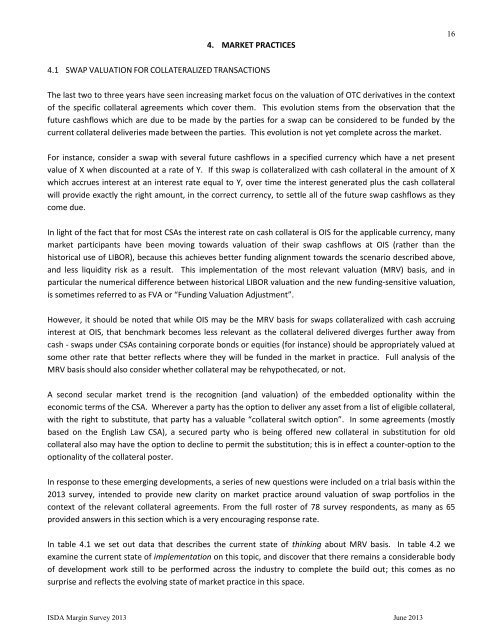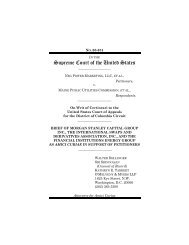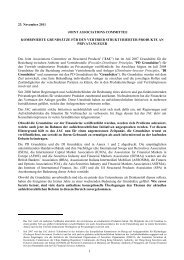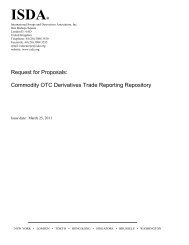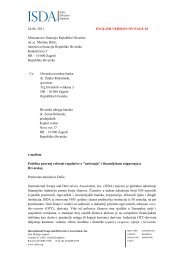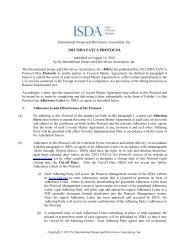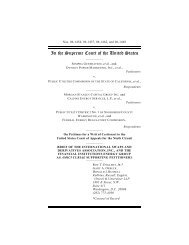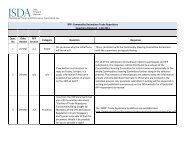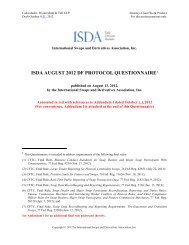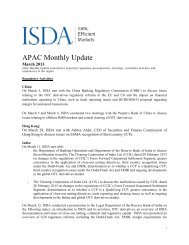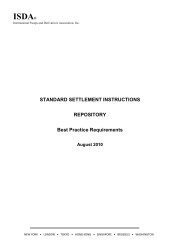ISDA Margin Survey 2013
ISDA Margin Survey 2013
ISDA Margin Survey 2013
Create successful ePaper yourself
Turn your PDF publications into a flip-book with our unique Google optimized e-Paper software.
4. MARKET PRACTICES<br />
16<br />
4.1 SWAP VALUATION FOR COLLATERALIZED TRANSACTIONS<br />
The last two to three years have seen increasing market focus on the valuation of OTC derivatives in the context<br />
of the specific collateral agreements which cover them. This evolution stems from the observation that the<br />
future cashflows which are due to be made by the parties for a swap can be considered to be funded by the<br />
current collateral deliveries made between the parties. This evolution is not yet complete across the market.<br />
For instance, consider a swap with several future cashflows in a specified currency which have a net present<br />
value of X when discounted at a rate of Y. If this swap is collateralized with cash collateral in the amount of X<br />
which accrues interest at an interest rate equal to Y, over time the interest generated plus the cash collateral<br />
will provide exactly the right amount, in the correct currency, to settle all of the future swap cashflows as they<br />
come due.<br />
In light of the fact that for most CSAs the interest rate on cash collateral is OIS for the applicable currency, many<br />
market participants have been moving towards valuation of their swap cashflows at OIS (rather than the<br />
historical use of LIBOR), because this achieves better funding alignment towards the scenario described above,<br />
and less liquidity risk as a result. This implementation of the most relevant valuation (MRV) basis, and in<br />
particular the numerical difference between historical LIBOR valuation and the new funding-sensitive valuation,<br />
is sometimes referred to as FVA or “Funding Valuation Adjustment”.<br />
However, it should be noted that while OIS may be the MRV basis for swaps collateralized with cash accruing<br />
interest at OIS, that benchmark becomes less relevant as the collateral delivered diverges further away from<br />
cash - swaps under CSAs containing corporate bonds or equities (for instance) should be appropriately valued at<br />
some other rate that better reflects where they will be funded in the market in practice. Full analysis of the<br />
MRV basis should also consider whether collateral may be rehypothecated, or not.<br />
A second secular market trend is the recognition (and valuation) of the embedded optionality within the<br />
economic terms of the CSA. Wherever a party has the option to deliver any asset from a list of eligible collateral,<br />
with the right to substitute, that party has a valuable “collateral switch option”. In some agreements (mostly<br />
based on the English Law CSA), a secured party who is being offered new collateral in substitution for old<br />
collateral also may have the option to decline to permit the substitution; this is in effect a counter-option to the<br />
optionality of the collateral poster.<br />
In response to these emerging developments, a series of new questions were included on a trial basis within the<br />
<strong>2013</strong> survey, intended to provide new clarity on market practice around valuation of swap portfolios in the<br />
context of the relevant collateral agreements. From the full roster of 78 survey respondents, as many as 65<br />
provided answers in this section which is a very encouraging response rate.<br />
In table 4.1 we set out data that describes the current state of thinking about MRV basis. In table 4.2 we<br />
examine the current state of implementation on this topic, and discover that there remains a considerable body<br />
of development work still to be performed across the industry to complete the build out; this comes as no<br />
surprise and reflects the evolving state of market practice in this space.<br />
<strong>ISDA</strong> <strong>Margin</strong> <strong>Survey</strong> <strong>2013</strong> June <strong>2013</strong>


